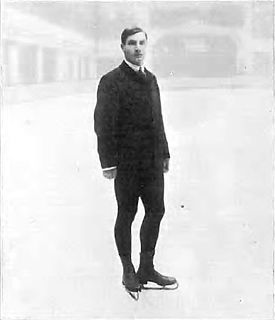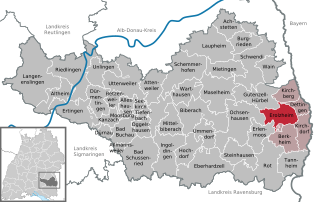
The 1936 Winter Olympics, officially known as the IV Olympic Winter Games, were a winter multi-sport event held from 6 to 16 February 1936 in the market town of Garmisch-Partenkirchen in Bavaria, Germany. The country also hosted the 1936 Summer Olympics, which were held in Berlin. It was the last year in which the Summer and Winter Games both took place in the same country.

The 1964 Winter Olympics, officially known as the IX Olympic Winter Games, was a winter multi-sport event which was celebrated in Innsbruck, Austria, from January 29 to February 9, 1964. The Games included 1091 athletes from 36 nations, and the Olympic Torch was carried by Joseph Rieder, a former alpine skier who had participated in the 1956 Winter Olympics.

Karl Emil Julius Ulrich Salchow was a Swedish figure skater, who dominated the sport in the first decade of the 20th century.

Ernst Baier was a German figure skater who competed in pair skating and single skating. He became Olympic pair champion in 1936 together with Maxi Herber. The duo also won several World and European championships.

Karl Schäfer was an Austrian figure skater and swimmer. In figure skating, he became a two-time Olympic champion at the 1932 Winter Olympics and the 1936 Winter Olympics. He was also a seven-time World champion (1930–1936) and eight-time European champion (1929–1936). As a swimmer, he competed at the 1928 Summer Olympics in the 200 metre breaststroke.

Sabine Baeß, married name Marbach, is a German former pair skater. With her partner Tassilo Thierbach, she is the 1982 World champion and a two-time European champion.

Ingo Steuer is a German pair skater and skating coach. With Mandy Wötzel, he is the 1998 Olympic bronze medalist, the 1997 World champion, the 1995 European champion, and a four-time German national champion. As a coach, he led Aliona Savchenko and Robin Szolkowy of Germany to multiple world and European titles.

Romy Kermer is a German figure skating coach and former competitive pair skater. With Rolf Oesterreich, she is the 1976 Olympic silver medalist.

Günter Zöller is a German figure skating coach and former competitor for East Germany. He is the 1970 World bronze medalist, the 1970 European bronze medalist, a five-time Blue Swords champion, and a five-time East German national champion.

Tassilo Thierbach is a German former pair skater. With partner Sabine Baeß, he is the 1982 World champion and a two-time European champion.

The European Figure Skating Championships is an annual figure skating competition in which figure skaters compete for the title of European champion. Medals are awarded in the disciplines of men's singles, women's singles, pair skating, and ice dance. The event is sanctioned by the International Skating Union (ISU) and is the sport's oldest competition. The first European Championships was held in 1891 in Hamburg, Germany and featured one segment, compulsory figures, with seven competitors, all men from Germany and Austria. It has been, other than four periods, held continuously since 1891, and has been sanctioned by the ISU since 1893. Women were allowed to compete for the first time in 1930, which is also the first time pairs skating was added to the competition. Ice dance was added in 1954. Only eligible skaters from ISU member countries in Europe can compete, and skaters must have reached at least the age of 15 before July 1 preceding the competition. ISU member countries can submit 1-3 skaters to compete in the European Championships.

Herma Szabo was an Austrian figure skater who competed in ladies' singles and pairs. As a single skater, she became the 1924 Olympic champion and a five-time world champion (1922–1926). She also won two world titles in pairs with Ludwig Wrede.
SC Karl-Marx-Stadt was a sports club located at Karl-Marx-Stadt in the German Democratic Republic.

Erolzheim is a town in the district of Biberach in Baden-Württemberg in Germany.
Hellmut Seibt was an Austrian figure skater. He was the 1952 Olympic silver medalist, 1951 World bronze medalist, a two-time European champion (1951–52), and three-time national champion.
Samvel Gezalian is an Armenian former competitive ice dancer who represented the Soviet Union, Belarus, and Armenia in international competition. With Tatiana Navka, he is the 1991 Skate America and Nations Cup champion and placed 11th at the 1994 Winter Olympics for Belarus. With Ksenia Smetanenko, he is the 1997 Golden Spin of Zagreb champion and competed at the 1998 Winter Olympics for Armenia.
Wilhelm Zenger was a German figure skater.
Sven Meyer was a German figure skater. He was the 1998 Karl Schäfer Memorial bronze medalist and 1998 German national champion.
Nils Köpp is a German former figure skater who represented East Germany. He is the 1983 World Junior bronze medalist. After moving up to the senior level, he won bronze at the 1985 Golden Spin of Zagreb, silver at the 1986 Karl Schäfer Memorial, and five medals at the East German Championships.












